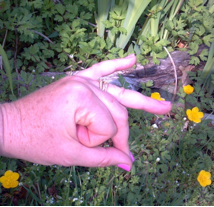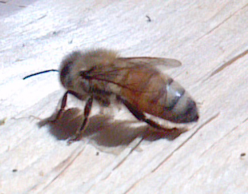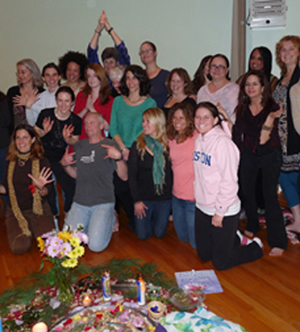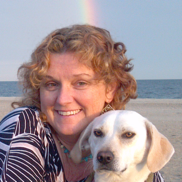What's all the Buzz?
by Diane Kovanda
Some teachers receive an apple or sweet little trinket from their graduating students. My class gave me a bee hive. Yes, they gave me 5,000 bees, a bee queen and all the materials to start a hive in my backyard. My mind was abuzz - what do you do when 5,000 bees arrive at your house?
It all began while I was teaching yoga to a group of yoga teachers earlier this year. I direct the Kind Yoga teacher certification program, and usually we have about 15 students each semester learning to be yoga teachers. We do everything from yoga postures to meditations, breathing practices, anatomy, physiology and mudras.
I have a feeling the graduates got the idea of gifting me a bee hive while I was teaching them "Bee Mudra." What is a Bee Mudra?
It's a practice in yoga – a specific way you position your hands, sometimes called a "posture" for your hands. The most common mudra you may be familiar with is anjeli mudra – which looks like hands in prayer.
There are hundreds of other mudras, and each one has a quality associated with it, the bee mudra strengthens your immune system.

While teaching a class about the bee mudra and strengthening our own immune systems, I shared my concern for the immune systems of bees across the world. Their numbers have been dwindling due to use of common pesticides. Bees are prime pollinators of about one third of the crops in the U.S.
Although I am not much of an insect lover (I much prefer dogs), I wanted to give the bees a place to live in my back yard, and I intended to educate myself in the care of bees and giving them a good garden without pesticides.
Fast forward to graduation day. Liz Wiley, newly-certified yoga teacher, presented me with a gift certificate for a hive. WOW. I was completely speechless. Liz and friends had done the research and followed through on the best present I have ever received.
First, the packaged hive materials arrived by UPS – boxes upon boxes barricaded my front door. Once I put all the puzzle pieces together, the instructions said to waterproof the outside of the wooden box hive.
Every day for a week, I would give it another coat of water-based sealer. I didn't know when to stop, adding coat upon coat, wanting it to be a really nice waterproof home for the coming bees. I kept imagining them moving in with little suitcases and saying, "wow, Buzzy, nice dry place, queen's gonna love it!"
My friend North Cairn gave me a great book on bees by Sue Hubbell. I read parts of it religiously every night, along with other how-to backyard bee books. Sue is a beekeeper of three hundred hives in the Ozark Mountains. Her descriptions of beekeeping activities and love of the bees imparted some knowledge and understanding of bees.

One of Diane's worker bees
Click here to see a YouTube video of
Diane's bees arriving at their new home!
I remember being completely shocked to read that some beekeepers take the honey from the hives and then proceed to gas and kill their bees at the end of the season, starting with a new colony the next spring. This way they don't have to worry about leaving enough honey for the bees to survive the winter.
This seemed so ungrateful and barbaric. But some people find this efficient and profitable. Hmm, okay, suddenly my kind image of all beekeepers just became tainted. Take a deep breath and stay on track.
Late April, my friend Deborah McCulloch called me and said, "The bees arrive tomorrow! Truck load lands in Harwich, I'll pick them up for you, drive them over to your house, and we'll install them, make some sugar syrup so they have welcome food!"
She arrived with a small two-foot crate of the loudest buzz ever. She carried them from her car and began preparations with the hive. Deborah was fearless. She showed me how to put on the veil and gloves.
I tucked in my clothing so no curious bees would check me out too intimately. We were ready to put them into their new home. The buzz got louder as they explored their new digs. I stood close by – about 5 feet away with no protective veil – just my jeans and sweatshirt. No bee bothered me.
Deb installed the queen, who came in a special small crate with her attendants. She was kept safe in there until the whole hive became cohesive with her special scent. Eventually, the sugar plug in her special crate would be eaten away and the queen would be free to roam and begin her queenly duties.
I only wanted to give them a safe place to live, but I fell in love with the bees that day. I am amused by the responses I get from folks who say I am going to be greatly rewarded for doing this with good tasting honey. I don't know if I'll take any honey. Maybe if it's pouring out of the hive and I am educated by a kind beekeeper that this honey collecting really must be done.
What if I just give them some yard and flower space? What if I don't need to take? Maybe humans have taken enough and I could be one of the people that gives them a little break in life. Who knows? I may be all wrong. But I'm willing to learn and inquire. I will do my best to be a good hostess.


Kind Yoga Teacher Training
Meditation Training
Classes held in Centerville
July 27 - 29
Let Your Yoga Dance®
Festival for Women in Wisdom Years
Designed especially for women ages 35 and up, this festival is a fabulous, fun-filled, yoga-dancing event. We are reinventing the conversation about aging!
Register here
508 -776-1990
www.kindyoga.com
If you are interested in a research study just completed at Harvard School of Public Health, click on this link: Use of Common Pesticide Linked to Bee Colony Collapse
The study will appear in the June issue of the Bulletin of Insectology. "The significance of bees to agriculture cannot be underestimated," says Lu. "And it apparently doesn't take much of the pesticide to affect the bees. Our experiment included pesticide amounts below what is normally present in the environment."
Pinpointing the cause of the problem is crucial because bees—beyond producing honey—are prime pollinators of roughly one-third of the crop species in the U.S., including fruits, vegetables, nuts, and livestock feed such as alfalfa and clover.
Massive loss of honeybees could result in billions of dollars in agricultural losses, experts estimate.

Diane has been practicing Hatha yoga for over 25 years. She is the founder and director of training at Kind Yoga School, and Co-founder of Calm Warrior Training, which provides criminal justice professionals with stress reduction and decompression tactics.
She is an advocate for effectively reducing our carbon footprint by making informed decisions.
Join her this summer at Kripalu Yoga Center in Lenox MA for a Festival for Women In Wisdom Years - July 27-29, as we reinvent the conversation about Women and Aging.
Visit www.KindYoga.com and www.CalmWarrior.com for more details.
 |
